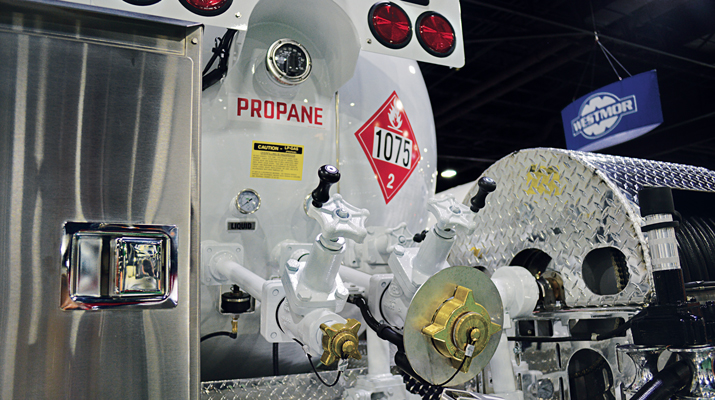Slimmed-down energy bill offered
Senate backers of major energy legislation have introduced a slimmed-down package
since the Senate has not approved a conference agreement.
Senate Energy and Natural Resource Committee Chairman Pete Dominici’s (R-NM)
revised Energy Policy Act retains most of the provisions that favor the propane
industry: tax credits for alternative-fueled vehicles, energy-efficient property
and appliances, as well as funding for clean-burning school buses and larger
assistance for the Low-Income Home Energy Assistance Program.
Dominici’s new bill bypassed committees and goes straight to the Senate floor
– if he can get a vote. Democrats still balked, saying it’s too costly and that
Congress would be better off passing energy tax credits or other benefits as
part of smaller legislation or attached to another bill.
The Senate has taken some steps in that direction. It approved the Poverty
Reduction & Prevention Act, increasing LIHEAP authorization to $3.4 billion.
The bill now goes to three House committees.
The House remains optimistic on passing a major energy plan. It approved a
budget resolution for 2005 that would allow funding for all the conference-approved
provisions.
Meanwhile, a White House threat forced a scaling down of reauthorization of
the Transportation Equity Act for the 21st ccentury. President George W. Bush
threatened to veto a proposed House reauthorization bill with a $375 billion
price tag over six years. Bush said he wanted it trimmed down to $256 billion.
So the House passed a Transportation Equity Act trimmed to $275 billion.
The bill remains vague about where the $100 billion in savings would come from,
leaving details to a conference. But it did not remove any programs from its
earlier draft. Both bills would run through 2009, reauthorize hazmat programs,
and add new highway safety technology funding.
The House-passed bill also maintains a Clean Fuels Formula Grant Program to
finance construction, leasing or retrofitting of buses to run on non-polluting
energy. And it would increase penalties for out-of-service and false records
violations and require states to enforce the rules.
The House bill also would require states to improve their commercial motor
vehicle safety programs and clarify that all persons who design and inspect
hazmat packages or components of them, and those who prepare and receive such
packages, are subject to hazmat regulations.
The measure also calls on the Department of Transportation to create a working
group to develop uniform forms and procedures for states to register and give
permits to hazmat transporters.
Briefly Speaking
- Senate seeks more aidThe Senate approved a non-binding provision in its 2005 budget resolution
calling for adequate funding increases for LIHEAP and Weatherization, saying
“persons in some sectors simply cannot” adapt to propane price
increases. - Fingerprint deadline extendedThe Transportation Security Administration delayed until next Jan. 31
the date at which states will have to conduct fingerprint-based background
checks on commercial drivers seeking hazmat endorsements. The rule was to
have taken effect April 1. But TSA learned that states need more time to
modify their safety and testing programs. - LPG refueling sites expandYou can refuel your auto with propane at 4,008 stations across the nation,
according to the Energy Information Administration’s count. EIA says that
the number of LPG-powered vehicles nationwide has grown steadily from 172,806
in 1995 to 187,680 in 2002. EIA’s projection for this year: 194,389.















